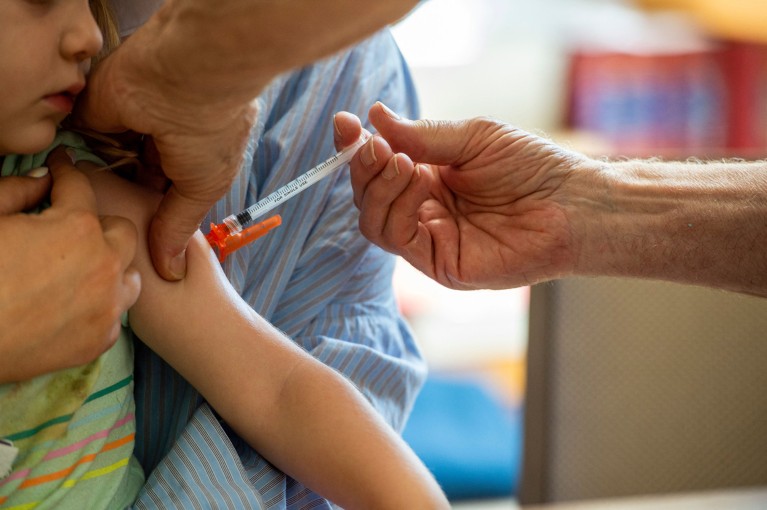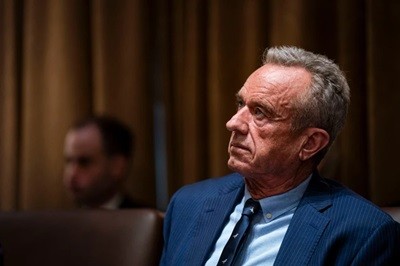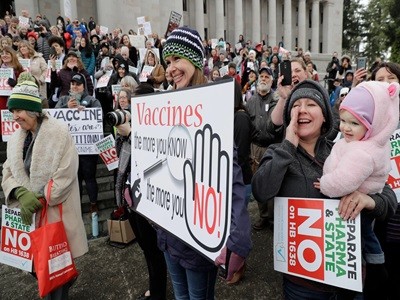
Eight new members have been appointed to the US highly effective Advisory Committee on Immunization Practices, which performs a big half within the vaccines taken by US kids and adults. Credit score: Joseph Prezioso/AFP/Getty
An emergency-room physician, critics of COVID-19 vaccines and an obstetrician who advises a complement firm are among the many advisers handpicked by vaccine skeptic Robert F. Kennedy Jr, the pinnacle of the US Division of Well being and Human Providers (HHS), to offer recommendation on vaccines to the federal authorities.
Kennedy introduced his new roster for the influential Advisory Committee on Immunization Practices (ACIP) on 11 June — simply two days after he fired all 17 of its earlier members and accused the ACIP of “malevolent malpractice”. The ACIP advises US public-health officers as to who ought to obtain authorised vaccines, and when. These suggestions are then usually used to information whether or not private and non-private health-insurance programmes pays for the photographs.
Kennedy has pledged that the ACIP will re-evaluate the vaccine “schedule” for kids — the listing of which vaccines kids ought to get and when they need to get them. This week’s shakeup of the committee is “a significant step in direction of restoring public belief in vaccines,” Kennedy stated in a submit on the social media platform, X.
Will RFK Jr’s vaccine agenda make America contagious once more?
A number of of the brand new ACIP members have expressed public help for vaccines. However various them have additionally expressed scepticism; one serves on the board of an anti-vaccination group, and a second has been a distinguished sceptic of the COVID-19 vaccines on social media. As first reported by the biomedical information outlet STAT, Kennedy included 4 of the brand new committee members within the dedication to his 2021 guide The Actual Anthony Fauci: Invoice Gates, Massive Pharma, and the World Warfare on Democracy and Public Well being.
“It is a catastrophe for public well being,” says Adam Ratner, a paediatric infectious illnesses doctor in New York Metropolis. “It has the potential to set us again many years.” The HHS didn’t reply to a request for remark earlier than publication.
Far-reaching implications
Infectious-disease specialists fear concerning the implications of the ACIP probably voting to suggest fewer vaccines or fewer doses than are at the moment suggested. Paul Offit, an infectious-diseases paediatrician on the Kids’s Hospital of Philadelphia and co-inventor of a rotavirus vaccine who served on the ACIP from 1998 to 2003, says insurers don’t must cowl vaccines that aren’t really useful by the ACIP. And “medical doctors or pharmacists who give vaccines could really feel that they’d be answerable for giving that vaccine”, he provides.
Even those that pays for vaccines out of pocket would possibly discover them tougher to get with out an ACIP advice, says Arthur Reingold, an epidemiologist on the College of California, Berkeley, as a result of general demand for the photographs will lower. That, in flip, could lead on some pharmacies to cease stocking them.
Offit notes that on the ACIP’s subsequent assembly, which begins 25 June, the panel will resolve whether or not to suggest vaccines for COVID-19, the human papillomavirus, meningococcal illness and RSV. “These are established vaccines, and we’re voting on them?” Offit says. “All the childhood and grownup immunisation schedule is on the desk.”
Tips on how to communicate to a vaccine sceptic: analysis reveals what works
Kennedy has criticized the ACIP for what he says are rampant conflicts of curiosity amongst its members. On 12 June, the biopharma information outlet Endpoints Information reported that two newly named ACIP members, Robert Malone and Martin Kulldorff, have acquired fee for serving as professional witnesses in lawsuits in opposition to pharmaceutical firm Merck over two of its vaccines. Malone stated on X that this work ended six years in the past.
Kennedy has additionally stated that previous committee members didn’t demand what he considers to be enough security trials with management teams that acquired a placebo, earlier than recommending vaccines.
However most of the vaccine research included placebo controls, Ratner says, except it was unethical to conduct the trial with one. And Reingold, who has served on the ACIP prior to now, says that the committee has strict insurance policies relating to conflicts of curiosity and that committee members should recuse themselves from any vote which may pose a battle. “The problem of potential conflicts of curiosity has been radically overblown and unfairly known as into query the objectivity of this panel,” he says.
Offit says a number of unbiased teams have reviewed earlier ACIP members and located no conflicts of curiosity. “Now, the battle of curiosity is actual as a result of these of us are indebted to RFK Jr, who simply gave them this place,” he says.
Vetting course of
Researchers are additionally involved concerning the lack of experience. The committee’s new lineup is “disturbing”, says Nancy Bennett, a public-health specialist on the College of Rochester Medical Middle in New York.
Prior to now, members had been nominated after which vetted by employees on the US Facilities for Illness Management (CDC) earlier than being despatched to the pinnacle of the CDC and, lastly, the pinnacle of the HHS for approval. Bennett says the vetting course of generally took years. “The ACIP was meant to be composed of individuals with deep experience within the space,” Ratner says. “That’s what we now have misplaced.”
Joseph Hibbeln
Hibbeln is a psychiatrist and neuroscientist who as soon as labored on the US Nationwide Institutes of Well being. His latest papers1 have targeted on the connection between diet and varied issues, together with mental-health situations, and his LinkedIn profile states that twenty-first-century diets are contributing to “insufficient mind vitamins and are seemingly contributing to the excessive burden of psychological sicknesses worldwide”. A search of PubMed, a database of biomedical papers, didn’t flip up any papers he has authored about vaccines or infectious illness. He didn’t reply to a request for remark.
Martin Kulldorff
Kulldorff is a Swedish epidemiologist and senior scholar on the Brownstone Institute, a suppose tank based mostly in West Hartford, Connecticut, that shaped “to offer an unbiased voice for private liberty” and to oppose lockdown insurance policies instituted by public officers in the course of the COVID-19 pandemic. Together with Jayanta Bhattacharya, the present head of the US Nationwide Institutes of Well being, Kulldorff wrote the Nice Barrington Declaration in 2020, which advocated in opposition to COVID-19 lockdowns aside from susceptible populations, and drew a lot pushback from the medical neighborhood.
Final yr, Kulldorff wrote in Metropolis Journal that he was fired from Harvard College in Cambridge, Massachusetts, for refusing a COVID-19 vaccine although he already had immunity from being contaminated. He additionally wrote that “vaccines are an important medical invention, permitting folks to acquire immunity with out the danger that comes from getting sick,” however advised that trials of COVID-19 vaccines early within the pandemic weren’t correctly designed. Kulldorff didn’t reply to Nature’s request for remark.
Retsef Levi
Levi is a professor of operations administration on the Massachusetts Institute of Know-how in Cambridge. He has printed a number of papers on COVID-19, together with one2 expressing issues about unwanted side effects of the COVID-19 vaccines. In a submit on social-media platform X in 2023, Levi stated, “The proof is mounting and indeniable that MRNA vaccines trigger critical hurt together with loss of life, particularly amongst younger folks. We’ve got to cease giving them instantly!” Levi didn’t reply to a request for remark.

